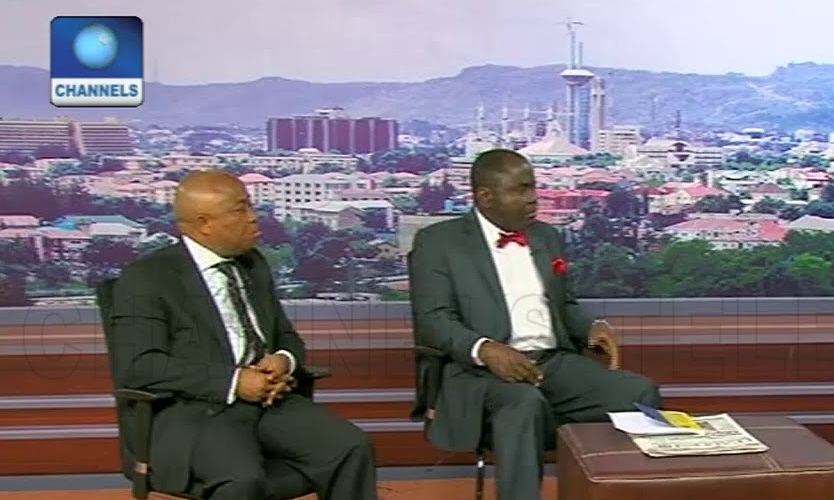Economy
Okutepa, Ananaba Differ on NFIU Ban on Cash Withdrawals from Govt Accounts

By Adedapo Adesanya, Dipo Olowookere
Two Senior Advocates of Nigeria (SANs), Mr Jibrin Okutepa and Mr Paul Ananaba, have expressed different opinions on the recent ban on cash withdrawals from government accounts by the Nigerian Financial Intelligence Unit (NFIU).
While speaking on the flagship breakfast show on Channels Television, Sunrise Daily, monitored by Business Post on Friday, Mr Okutepa said he supports the ban because it would help in tracking government spending.
However, in his opinion, Mr Ananaba argued that the NFIU does not have the power to restrict the state and local governments from having access to their funds, either through cashless or otherwise.
“The NFIU does not have the powers to enforce such except it works with other agencies; standing alone, NFIU ought not to have made that statement; it should have been a joint statement [with other agencies like the EFCC, CBN],” the legal luminary said.
On Thursday, while addressing reporters, the chief executive of NFIU, Mr Moddibo Tukur, explained that from March 1, 2023, the new policy would become effective, noting that it was to curb the rate at which monies were withdrawn from public accounts in total disregard to the money laundering laws, and also to reduce corruption in public service.
He warned that any government official that withdraws cash from public accounts would risk investigation by the Economic and Financial Crimes Commission (EFCC), the Independent Corrupt Practices Commission (ICPC), and the Nigeria Police Force, in collaboration with the NFIU.
“The NFIU had told banks and government agencies at all levels to go fully digital by moving online, as all transactions involving public money must be routed through the banks for the purpose of accountability and transparency.
“This is not reversible as we are only enforcing the law. As far as we are concerned, Nigeria will become a full non-cash economy by March 1, 2023, this year.
“As a consequence, any government official that withdraws even one naira cash from any public account from March 1 will be investigated and prosecuted in collaboration with relevant agencies like the Economic and Financial Crimes Commission (EFCC), Independent Corrupt Practices Commission (ICPC) and Nigeria Police Force (NPF),” he declared.
Mr Okutepa, while commenting, said the organisation has the power to carry out this function.
“I support the position and enforcement of the provisions of the Act that set them up in order to prevent money laundering.
“I agree that no government officials should be allowed, including Governors, Ministers, presidential aides, the President himself should not be allowed to withdraw huge amounts of money,” the legal practitioner submitted.
Mr Okutepa noted that if this policy is religiously enforced, it will curb corruption, especially funds withdrawn by state governors through security votes.
“For instance, you talk about this particular thing called security votes; there is a lot of money being withdrawn under the guise of security votes, and yet, we are in a state where [we have serious security threats], and people are afraid to go to their villages,” he said.
“My fear about this law is not the intention but the ability to follow through.
“From the point of law, looking at the provisions of the law that set up the NFIU, particularly Section 1 that talked about its aims and objectives, Section 2 that created the act and Section 3 that set out the functions, [it has the power to carry out this policy].
But Mr Ananaba said, putting sentiment aside, the NFIU cannot enforce the policy alone because it has limited powers to do so.
“You want to go cashless, but does NFIU have the capacity or guarantee that the country has the technology for a totally cashless society from March 1?” he queried.
“I would have expected that the CBN and other financial institutions would be part of a coalition that will bring this to pass,” he submitted.
Speaking further, he asked, “On what basis will the NFIU give directives to states? What happens when things go wrong [and the states challenge or go against the policy]?”
“My point is that NFIU cannot go outside the laws setting it up in 20218; it does not give it the powers to regulate cash withdraw,” he emphasised
Economy
Dangote Refinery Makes First PMS Exports to Cameroon

By Aduragbemi Omiyale
The Dangote Refinery located in the Lekki area of Lagos State has made its first export of premium motor spirit (PMS) just three months after it commenced the production of petrol.
In September 2024, the refinery produced its first petrol and began loading to the Nigerian National Petroleum Company (NNPC) on September 15.
However, due to some issues, the facility has not been able to flood the local market with its product, forcing it to look elsewhere.
In a landmark move for regional energy integration, Dangote Refinery has partnered with Neptune Oil to take its petrol to neighbouring Cameroon.
Neptune Oil is a leading energy company in Cameroon which provides reliable and sustainable energy solutions.
Dangote Refinery said this development showcases its ability to meet domestic needs and position itself as a key player in the regional energy market, adding that it represents a significant step forward in accessing high-quality and locally sourced petroleum products for Cameroon.
“This first export of PMS to Cameroon is a tangible demonstration of our vision for a united and energy-independent Africa.
“With this development, we are laying the foundation for a future where African resources are refined and exchanged within the continent for the benefit of our people,” the owner of Dangote Refinery, Mr Aliko Dangote, said.
His counterpart at Neptune Oil, Mr Antoine Ndzengue, said, “This partnership with Dangote Refinery marks a turning point for Cameroon.
“By becoming the first importer of petroleum products from this world-class refinery, we are bolstering our country’s energy security and supporting local economic development.
“This initial supply, executed without international intermediaries, reflects our commitment to serving our markets independently and efficiently.”
Economy
Strong Investor Sentiment Keeps NGX Index in Green Territory by 0.31%

By Dipo Olowookere
The Nigerian Exchange (NGX) Limited remained in the green territory on Wednesday after it rallied by 0.31 per cent on the back of sustained bargain-hunting activities by investors.
Business Post reports that all the key sectors of the market closed higher at midweek as a result of the renewed interest in local equities.
Data showed that the energy index appreciated by 2.59 per cent, the insurance space grew by 2.34 per cent, the industrial goods sector improved by 0.15 per cent, the banking counter expanded by 0.06 per cent, and the consumer goods industry rose by 0.04 per cent.
At the close of business, the All-Share Index (ASI) gained 302.71 points to settle at 98,509.68 points compared with Tuesday’s closing value of 98,206.97 points and the market capitalisation added N183 billion to close at N59.715 trillion versus the preceding day’s N59.532 trillion.
It was observed that the level of activity yesterday waned as the trading volume, value and number of deals decreased by 65.93 per cent, 49.22 per cent, and 12.70 per cent, respectively.
On Wednesday, a total of 320.1 million stocks valued at N6.5 billion were transacted in 7,943 deals, in contrast to the 939.4 million stocks worth N12.8 billion traded in 9,098 deals.
The busiest equity at midweek was eTranzact, which transacted 70.3 million units for N474.2 million, Universal Insurance traded 23.8 million units worth 8.1 million, Zenith Bank exchanged 21.2 million units valued at N933.5 million, FBN Holdings sold 18.6 million units worth N491.2 million, and UBA traded 14.0 million units valued at N465.8 million.
At the close of transactions, 34 shares ended on the gainers’ log and 17 shares finished on the losers’ chart, representing a positive market breadth index and strong investor sentiment.
Africa Prudential gained 10.00 per cent to quote at N14.30, Conoil also improved by 10.00 per cent to N352.00, and RT Briscoe expanded by 10.00 per cent to N2.42, as Golden Guinea Breweries jumped by 9.95 per cent to N7.18, while NEM Insurance grew by 9.74 per cent to N10.70.
However, Julius Berger lost 10.00 per cent to close at N155.25, Secure Electronic Technology shed 9.52 per cent to trade at 57 Kobo, Multiverse declined by 7.63 per cent to N5.45, Haldane McCall tumbled by 6.07 per cent to N4.95, and Honeywell Flour crashed by 5.62 per cent to N4.70.
Economy
Crude Oil Jumps as EU Slams Fresh Sanctions on Russia

By Adedapo Adesanya
Crude oil prices went up on Wednesday after the European Union (EU) agreed to an additional round of sanctions threatening Russian oil flows that could tighten global crude supplies.
During the session, Brent crude futures jumped by $1.33 or 1.84 per cent to $73.52 a barrel and the US West Texas Intermediate (WTI) crude futures rose by $1.70 or 2.48 per cent to $70.29 per barrel.
EU ambassadors agreed on a 15th package of sanctions on Russia over its war against Ukraine, targeting its shadow tanker fleet and Chinese firms making drones for the country.
The sanctions would target vessels from third countries supporting Russia’s war in Ukraine and add more individuals and entities to the sanctions list. It will not be adopted until after foreign ministers approve the package on Monday.
The shadow fleet has aided Russia in bypassing the $60 per barrel price cap imposed by the G7 on Russian seaborne crude oil in 2022 and has helped keep Russian oil flowing.
Prices were supported by the Energy Information Administration (EIA) which reported an estimated inventory decline of 1.4 million barrels for the week to December 6. In fuels, however, the EIA estimated sizable builds.
The crude oil inventory figure compares with a draw of 5.1 million barrels for the previous week that pushed prices higher for a while but the gains soon got erased by weak global demand growth prospects.
A day before the EIA, the American Petroleum Institute (API) had estimated inventory changes at a positive 499,000 barrels for the week to December 6.
Meanwhile, on Wednesday, the Organisation of the Petroleum Exporting Countries (OPEC) cut its 2024 global oil demand growth forecast for a fifth straight month and by the largest amount.
In its December report, the cartel expects 2024 global oil demand to rise by 1.61 million barrels per day, down from 1.82 million barrels per day last month.
OPEC also cut its 2025 growth estimate to 1.45 million barrels per day from 1.54 million barrels per day.
The 210,000 barrels per day cut in the 2024 figure is the largest of the five reductions OPEC has made in its monthly reports since August. In July, OPEC had expected world demand to rise by 2.25 million barrels per day.
Weak demand, particularly in top importer China, and non-OPEC+ supply growth were two factors behind the move.
-

 Feature/OPED5 years ago
Feature/OPED5 years agoDavos was Different this year
-
Travel/Tourism8 years ago
Lagos Seals Western Lodge Hotel In Ikorodu
-

 Showbiz2 years ago
Showbiz2 years agoEstranged Lover Releases Videos of Empress Njamah Bathing
-

 Banking6 years ago
Banking6 years agoSort Codes of GTBank Branches in Nigeria
-

 Economy2 years ago
Economy2 years agoSubsidy Removal: CNG at N130 Per Litre Cheaper Than Petrol—IPMAN
-

 Banking2 years ago
Banking2 years agoFirst Bank Announces Planned Downtime
-

 Sports2 years ago
Sports2 years agoHighest Paid Nigerian Footballer – How Much Do Nigerian Footballers Earn
-

 Technology4 years ago
Technology4 years agoHow To Link Your MTN, Airtel, Glo, 9mobile Lines to NIN











